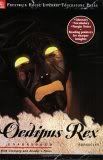
1.) Oedipus is the king of Thebes. He is the tragic hero in the drama. He is actually the ill-fated son of Laius and Jocasta who was predicted to kill Laius and marry Jocasta. Because of these prophecies, he ends up believing that Polybus and Meropé, the king and queen of Corinth, are his real parents. He leaves Corinth after an oracle makes a similar prophecy about him. He ends up killing a man at a place where three highways meet and answering the Sphinx’s riddle to become the king of Thebes and marry Jocasta as reward. In the drama, he is seeking the murderer of Laius to get rid of the plague in Thebes. He is a man admired by the Thebans because of his great intellect. But in the end, he falls from grace after his true identity is revealed. Oedipus is often described as the perfect example of a tragic hero whose hubris or pride and hammartia or error in judgment lead to his downfall.
2.) Jocasta is Laius’ widow and Oedipus’ mother. She later married Oedipus after Oedipus saved Thebes from the Sphinx. She believed in the prophecy that said her and Laius’ son would kill Laius. Thus, she gave her infant son to a herdsman to be left at the mountain of Cithaeron to die. Later on, she ceases to believe in human oracles after she is misled to believe that a band of foreign robbers killed Laius. As soon as she realizes Oedipus’ real identity, she discourages Oedipus to continue his inquiry. When Oedipus refuses to stop the search for Laius’ murderer, Jocasta hangs herself to death.
3.) Creon is Jocasta’s brother. He is the ascendant to Oedipus’ throne. He was sent to ask the Delphic Oracle how to stop the blight. He was also sent to get Teiresias, the blind prophet. Oedipus accuses him of plotting treachery. Creon defends himself by saying that he does not wish to reign over a plagued Thebes and that has never desired anything he does not deserve. Towards the end, he graciously helps Oedipus to be with his daughters and be exiled from Thebes. In the end, he becomes Thebes’ king.
4.) Teiresias is the blind prophet called upon by Oedipus to reveal Laius’ murderer. At the beginning, he refuses to name Laius’ murderer knowing that it would distress Oedipus and Jocasta. But when angered by Oedipus’ accusations, he names Oedipus as Laius’ killer. He knows the truth about Oedipus’ parentage and fate. Before he leaves, he tells Oedipus that Oedipus killed his own father, married his own mother and is fated to be exiled from Thebes because of the shame of his unspeakable deeds. Oedipus accuses him of conspiring with Creon to overthrow Oedipus.
5.) The Messenger from Corinth arrives at Thebes to tell Oedipus that Polybus is dead and the people of Corinth have elected Oedipus to be their king. He assures Oedipus’ that the prophecy about his marriage to his marriage will not come true by revealing that Polybus and Meropé are not his real parents. He reveals that he got the infant Oedipus from a herdsman from Thebes and that he gave the infant Oedipus to the childless Polybus and Meropé.
6.) The Herdsman is summoned by Oedipus to reveal the truth about Laius’ death and the identity of the infant Oedipus’ parents. He is hesitant to tell the truth knowing the consequences of its revelation. But ends up telling the truth after Oedipus threaten him.
7.) The Priest, with his followers, is in front of the palace at the start of the drama. He is praying that the plague that is killing all the vegetation and the babies in their mothers’ wombs would be lifted from Thebes. He asks Oedipus to save Thebes once again.
8.) The Second Messenger is also the attendant or servant of Oedipus and Jocasta. He narrates what happened at the palace after Jocasta and Oedipus realizes the truth.
9.) Ismene and Antigone are Oedipus’ young daughters who Oedipus calls for at the end of the drama. Oedipus is dismayed that they will never be married because of their cursed parents. Oedipus begs Creon to take care of them.
10.) The Chorus of Theban Elders is used as an exposition device in the drama. They narrate the dire situation in plague-stricken Thebes. They also reflect and speculate on the events during the Stasimons.
5 comments:
You didn't mention anything about Choragos. Why?
You also didnt mention anything about Joe Crack. Why?
You also didnt say anything about poop. Why?
you also didn't mention anything about penis. Why?
I LOVE cOCK
Post a Comment